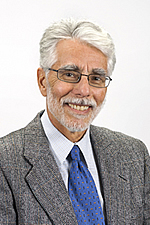Mid-Career Faculty Mentoring

William Maniscalco, M.D.,
University of Rochester School of
Medicine and Dentistry’s 2014
Academic Mentoring Award for
Junior Faculty
For mid-career faculty members, the key is to move beyond the very narrow focus of one’s own work and make an impact in the broader professional setting. Defining how one will accomplish this goal– whether through administrative responsibility, nationally collaborative research, major teaching and curriculum design roles, clinical innovations, or community and national service - is a major milestone.
Once promoted to associate professor, faculty are encouraged but not required to continue meeting with their mentoring committees. Anticipatory guidance for mid-career faculty focuses on their increasingly deep academic pursuits, growing independence as scholars, development of unique teaching portfolios, establishment as master clinicians, and consideration of departmental leadership roles. Discussions may evolve around: requirements and timetable for promotion, redefining careers, effectively networking and garnering national and internal reputation. In addition to meeting regularly with mentorship committees, mid-career faculty benefit substantially from individual regularly scheduled meetings with their division chiefs.